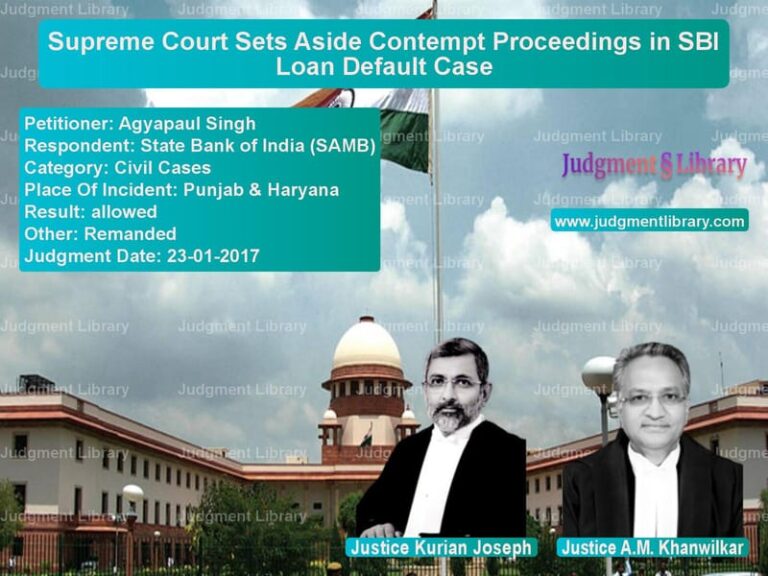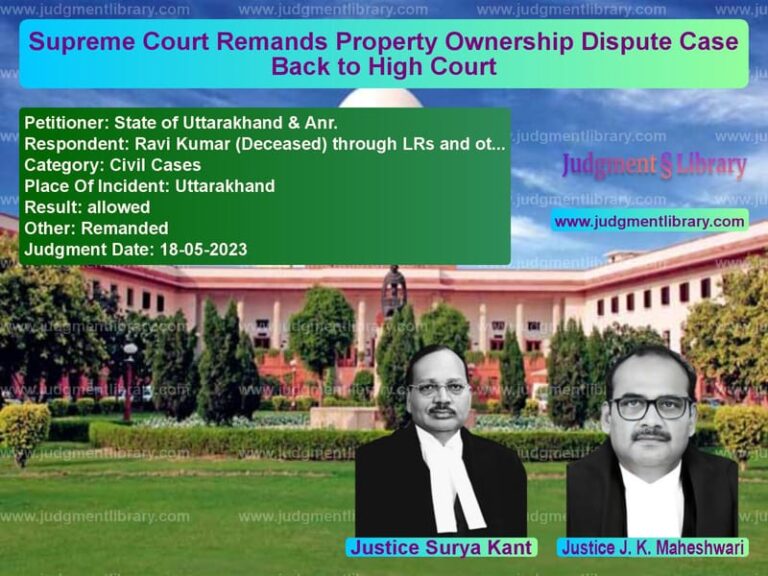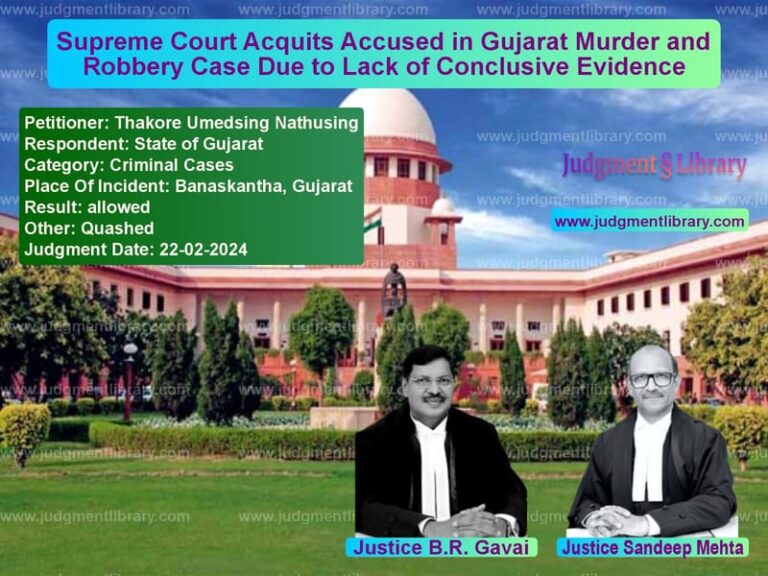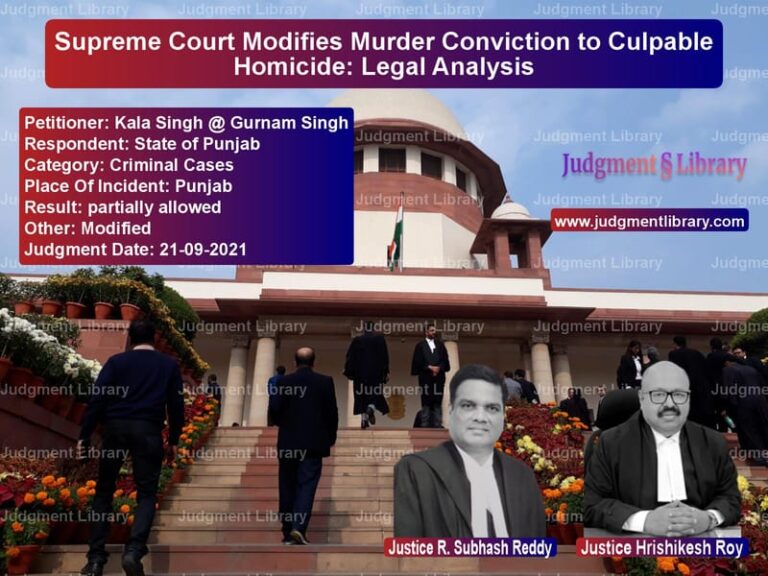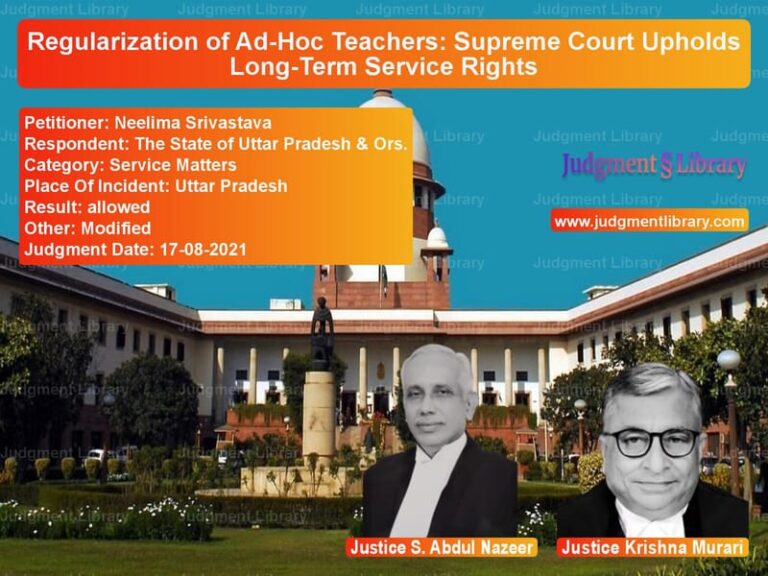Discharge of Accused in Corruption Case: An In-depth Analysis of the Legal Proceedings
The case involves the State of Tamil Nadu, through the Deputy Superintendent of Police, filing an appeal against the discharge of two individuals, R. Soundirarasu and his wife Suguna, from prosecution under the Prevention of Corruption Act. The original charge stemmed from allegations of disproportionate assets acquired by the accused during their tenure, with accusations of money laundering and illegal acquisition of assets. The case came to light after a First Information Report (FIR) was lodged in 2005 based on an investigation that suggested assets beyond their known sources of income. However, the High Court later discharged the accused, citing the lack of prima facie evidence to proceed with the case. The State appealed this decision in the Supreme Court, questioning the High Court’s interpretation of the law and the burden of proof in such cases.
In this judgment, we will explore the arguments presented by both the petitioner (the State) and the respondents (R. Soundirarasu and Suguna), as well as the reasoning adopted by the Supreme Court in deciding whether the High Court erred in discharging the accused. We will also discuss the legal principles laid down, which provide insights into the legal process surrounding corruption and asset concealment cases under the Prevention of Corruption Act.
Petitioner’s Arguments:
The petitioner, represented by the State’s Additional Advocate General, argued that the High Court had committed a serious error by discharging the accused. The primary contention was that the High Court placed an unreasonable burden on the prosecution, requiring them to prove the case beyond a reasonable doubt at the stage of framing charges. The petitioner submitted that, at the stage of framing charges, the court is only required to evaluate the prima facie case and not the probative value of the evidence.
Read also: https://judgmentlibrary.com/anticipatory-bail-granted-in-rape-case-supreme-courts-detailed-analysis/
The petitioner also highlighted the procedural error in the High Court’s reliance on documents produced by the accused, such as their income tax returns and other records. The petitioner argued that this was akin to conducting a mini-trial and that the High Court should not have delved into the credibility of the evidence at this stage.
Respondent’s Arguments:
The respondents, represented by their counsel, argued that the discharge was justified as no prima facie case existed against them. They contended that the prosecution had failed to show that the assets they acquired were disproportionate to their known sources of income. They further argued that the income tax returns submitted by the accused were not considered by the Investigating Officer in the proper perspective, and no documents were presented to show that the income of Suguna, the wife, was from unlawful sources.
The respondents also pointed out that the Investigating Officer had failed to consider the explanation given by R. Soundirarasu regarding the acquisition of assets. They argued that their sources of income, including Suguna’s independent business, were legitimate and disclosed to the income tax authorities, which should have been taken into account when assessing the evidence.
Court’s Evaluation:
The Supreme Court analyzed the submissions of both parties, focusing primarily on the application of Section 239 of the CrPC, which governs the discharge of the accused at the stage of framing charges. The court clarified that at this stage, the court is only required to determine whether there is a prima facie case against the accused, meaning that the evidence presented must show that the accused might have committed the offence. The court emphasized that it was not the role of the High Court or the trial court to conduct a full evaluation of the evidence or to decide the guilt of the accused at this stage.
The Supreme Court further noted that the High Court had gone beyond its jurisdiction by considering the defense presented by the accused in detail and by accepting their explanations without sufficient scrutiny. The court observed that the High Court had effectively conducted a trial by considering the income tax returns and the assets in the name of the accused’s family members, which was beyond the scope of the discharge application.
Legal Precedents:
In its judgment, the Supreme Court referred to several important cases, including State of Maharashtra v. Wasudeo (1981), State of Tamil Nadu v. N. Suresh Rajan (2014), and others that clarified the standard for determining whether a prima facie case exists. The court stressed the importance of the stage of discharge under Section 239 of the CrPC and explained that at this point, the court is only concerned with whether the charge is groundless, not with determining the sufficiency of the evidence to secure a conviction.
Conclusion:
The Supreme Court concluded that the High Court’s decision to discharge the accused was incorrect. The court found that the materials on record, even at face value, disclosed a prima facie case against the accused, warranting the framing of charges and continuation of the trial. The court emphasized that the stage of framing charges is not the time to weigh the evidence in detail, and the trial must proceed to determine the veracity of the charges against the accused. The Court set aside the High Court’s order and directed the Special Court to proceed with framing charges against the accused.
Petitioner Name: State of Tamil Nadu.Respondent Name: R. Soundirarasu and Suguna.Judgment By: Justice Dinesh Maheshwari, Justice J.B. Pardiwala.Place Of Incident: Tamil Nadu.Judgment Date: 05-09-2022.
Don’t miss out on the full details! Download the complete judgment in PDF format below and gain valuable insights instantly!
Download Judgment: state-of-tamil-nadu-vs-r.-soundirarasu-and-supreme-court-of-india-judgment-dated-05-09-2022.pdf
Directly Download Judgment: Directly download this Judgment
See all petitions in SC/ST Act Case
See all petitions in Fraud and Forgery
See all petitions in Bail and Anticipatory Bail
See all petitions in Money Laundering Cases
See all petitions in Judgment by Dinesh Maheshwari
See all petitions in Judgment by J.B. Pardiwala
See all petitions in allowed
See all petitions in supreme court of India judgments September 2022
See all petitions in 2022 judgments
See all posts in Criminal Cases Category
See all allowed petitions in Criminal Cases Category
See all Dismissed petitions in Criminal Cases Category
See all partially allowed petitions in Criminal Cases Category



